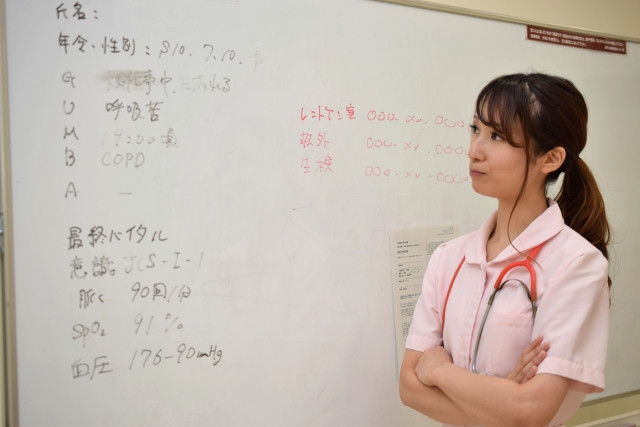In recent days, nursing is rapidly exerting a huge influence and relevance to Japanese society. This is brought by various demographic factors such as the aging population and increasing demand for healthcare. Leading universities in the country offer consolidated nursing programs that can be prolific for an international candidate.
Table of Contents
Nursing in Japan
One of the reasons to study in Japan is because it offers only the best nursing courses. International students will more than likely have higher chances of passing the national exam and being employed in a reputable hospital after graduation by choosing to study nursing as an undergraduate student in Japanese universities.
In the early times, the medical system of Japan was heavily influenced by Chinese medical practices. During the Meiji period, traditional medical services slowly turned to more modern western methods. Nursing personnel in Japan branched out not just to midwives but also to include the categories of public health nurses and nurses.
※ Japanese Nursing Association, "Nursing in Japan"
Japan also has the highest aging population in the world, primarily due to low fertility rates. The senior citizens of Japan swelled to a whopping 28% in 2018. Because of these circumstances, more seasoned individuals have a higher need for medical care because of their age and its implications to their deteriorating health. This is also one of the primary reasons Japan has an outstanding nursing education; it only wants the best nurses to take care of their aging population.
※ Statistics Bureau of Japan, "Statistical Handbook of Japan 2019," p.10
Because of Japan's current condition, where the country is faced with a shortage of enrollment in the medical industry, Japan is wide open for international students. However, the hurdle is high as your Japanese language skills as well as your academics must be top-notch. Let’s take a look at some of the top Nursing schools in Japan you may want to consider.
Writer's Pick
Pursuing Nursing studies in Japan

Below are some of the several institutions or universities offering undergraduate courses and programs in nursing for international students who wish to study in Japan:
1.St. Luke’s International University
St. Luke’s International University offers one of the most comprehensive nursing curricula in Japan. Their curriculum focuses both on theoretical knowledge and practical application through their robust practicum case studies. Even in the first year of nursing education, students can expect to be exposed to practical case studies with the following:
-
The first year of practical case studies would be focused on Communications in Nursing and service-learning
-
The second-year case study continues to focus on service-learning;
-
The third-year practicum case study focuses on Nursing Science;
-
The fourth-year practicum case studies focus on professional nursing and integrated nursing
St. Luke’s International University believes that students learn best by doing, which is the reason why the venue of their practicum case studies are in real hospitals including St. Luke’s International Hospital in Tokyo, Saiseikai Yokohama East Hospital in Kanagawa, and a couple of other children centers and cancer centers throughout Japan. St. Luke’s International University upholds the values of fairness and diversity. Therefore, it welcomes new enrollees from all walks of life - regardless of race, religion, age, gender, etc. as long as these students are qualified based on the school’s admission policy and requirements.
Interested enrollees would have to undergo two (2) admission examinations. A written exam is administered in Japanese and focuses on four (4) topics: English, Mathematics, Chemistry, and Biology. Successful applicants would then undergo an essay and interview portion for admission. Foreign students interested in studying at St. Luke’s International University should have adequate knowledge in the Japanese language to pass both admission tests. The average tuition fee for the first year is 1,750,000 yen and 1,550,000 yen for second through the fourth year.
※ St. Luke's International University, "College of Nursing" ※ St. Luke's International University, "Tuition and school fees (2017)"
2.Chiba University
The Nursing Curriculum in Chiba University also heavily focuses on practical case studies as a method to teach the essential skills to be a successful nurse. The nursing curriculum includes Nursing Knowledge and Skills, Ethical Mind, Problem-Solving Skills, Diversity Knowledge, and Self-directed learning. An advantage for Chiba University is that it also invests in international programs to ensure that its nursing students experience the value of diversity. It also offers different best practice sharing avenues through its active participation in international nursing forums to network with nursing universities and institutions across the globe.
Chiba University wants the best of the best and has a rigid entrance examination process where each stage has a quota. It starts with a General Entrance Examination Course, an Entrance Examination for Candidates with Principal Recommendation, and a separate Entrance Examination for Candidates with Work Experience Methods of Examination and transfer students. In 2019, only one Nursing international student enrolled at the University. The average tuition fee per year for nursing enrollees at Chiba University is more than 500,000 yen. The application fee, admission fee, and other expenses at Chiba University are an additional 300,000 yen.
※ Graduate School of Nursing, School of Nursing, Chiba University, "Undergraduate Program" ※ Chiba University, "Payment of tuition fees" ※ Japan Study Support, "千葉大学 | Chiba University"
3.Teikyo University

Teikyo University’s nursing curriculum starts with the foundation or the basics of nursing for the first year, and having more specialized courses in the second and third year, and finally applying all these theoretical knowledge in the fourth and final year of the nursing course. Teikyo University also welcomes international students with its various international programs and examinations catered towards the foreign population. Interested foreign students must undergo and pass the entrance examination for the Japanese language course. Entrance examination special selection for international students at the Teikyo University is no longer offered. The average tuition fee for nursing students is about 1,800,000 million yen per academic year (more for the first year with enrollment fees and such).
※ Teikyo University, "Admissions & Aids" ※ Teikyo University, "Tuition" ※ Japan Study Support, "帝京平成大学 | Teikyo Heisei University"
4.Kyoto University
Kyoto University offers a comprehensive and immersive nursing curriculum to its students such as basic nursing courses, clinical nursing, family nursing, and community counseling nursing courses. The main requirement for those who wish to study nursing at Kyoto University is to pass the Japanese Language Exam as most courses are taught in Japanese, so students must have sufficient proficiency in Japanese. Foreign applicants must also have excellent scholastic records and equivalent courses in their home country. The average tuition fee for undergraduate students is more than 500,000 yen per year plus additional admission of around 300,000 yen.
※ Kyoto University, "Tuition, Fees and Tuition Exemption" ※ Graduate School of Medicine and Faculty of Medicine Kyoto University, "Department of Nursing"
A final note for foreigners who would want to study in Japan, the primary requirement besides knowing sufficient Japanese is to obtain a student visa through the Embassy of Japan in your country or region.
After graduation
After graduation, nursing graduates in Japan are encouraged to undergo a credentialing system by passing the national board exam for nurses in Japan. Once passed, only then can they practice nursing in Japan. The majority of students who pass the national nursing board exam in Japan will later seek a career opportunity as advanced nurses, leaders, educators, researchers for the different medical facilities like hospitals, clinics, or home nursing stations in Japan. Others pursue further studies like a master’s degree or a doctorate degree. A minority will work for the Japanese government.
Summary

Japan’s nursing programs offer the best in both theoretical knowledge education and an immersive environment for students to practice their skills. With the high demand for nurses in Japan because of the ongoing world health crisis and the increasing aging population, more and more foreigners choose Japan to study and practice nursing. The work opportunity at the different medical institutions, government and private companies, and welfare facilities in Japan are high after you pass the nursing board exams. Developing such knowledge and skills in Japan's medical field is such your first step to a bigger long-term goal!

































